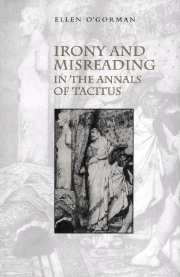Book contents
- Frontmatter
- Contents
- Dedication
- Preface
- 1 Introduction: irony, history, reading
- 2 Imperium sine fine:problems of definition in Annals 1
- 3 Germanicus and the reader in the text
- 4 Reading Tiberius at face value
- 5 Obliteration and the literate emperor
- 6 The empress's plot
- 7 Ghostwriting the emperor Nero
- 8 Conclusion: the end of history
- Bibliography
- General index
- Index locorum
5 - Obliteration and the literate emperor
Published online by Cambridge University Press: 30 September 2009
- Frontmatter
- Contents
- Dedication
- Preface
- 1 Introduction: irony, history, reading
- 2 Imperium sine fine:problems of definition in Annals 1
- 3 Germanicus and the reader in the text
- 4 Reading Tiberius at face value
- 5 Obliteration and the literate emperor
- 6 The empress's plot
- 7 Ghostwriting the emperor Nero
- 8 Conclusion: the end of history
- Bibliography
- General index
- Index locorum
Summary
The erasures, blanks and disguises that are the stock-in-trade of the political censor are features too of the very writing upon which he exercises his vigilance.
Malcolm Bowie, Freud, Proust and Lacan: Theory as FictionThe obliteration of Claudius' style we must accept with what resignation we can muster, nor perhaps is the loss serious.
Kenneth Wellesley, ‘Can you trust Tacitus?’The collapsing amphitheatre at Fidenae symbolises the threat that Tiberian dissimulation poses to the future, a threat countered (and replicated) in the partial assimilation of past and present which makes history possible. Despite Tacitus' claim that historical memory is resistant to tyrannical repression, the struggle for control of the past in anticipation of an imagined future remains dominated by imperial power of permitted meanings. This struggle for control can be situated in Tacitus' text: the conflict between the senatorial tradition of history and the imperial politics it narrates. The dynastic history which we have already seen emerging in the figures of Germanicus and Agrippina threatens to overwhelm this tradition. Tacitus emphasises the construction of dynastic history in his narrative of the later Julio-Claudian emperors, Claudius and Nero. In particular the figure of Claudius, the historian turned emperor, can be read within the dynamic of a dynastic history which he first seeks to construct and by which he is later circumscribed, when narrative control is taken over by his second imperial wife, the younger Agrippina.
- Type
- Chapter
- Information
- Irony and Misreading in the Annals of Tacitus , pp. 106 - 121Publisher: Cambridge University PressPrint publication year: 2000



